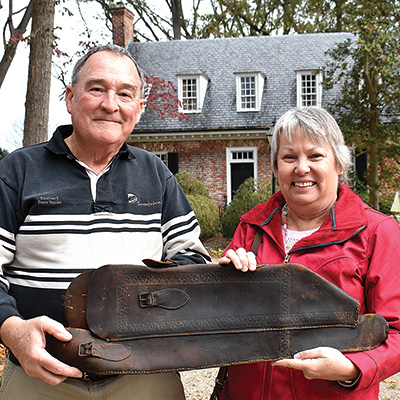
by Larry Chowning
When Marion Timbrook of Mechanicsville was cleaning out her great-uncle’s home in Rushmere near Smithfield, she came across a leather gun case dating back several generations.
At first she thought it might be a gun case related to her great-uncle’s own guns since he had been an avid duck and goose hunter, but on closer inspection she noticed a faded etching in the leather that read “A.J. Montague.”
“I had never heard of A.J. Montague so I googled him and to my surprise I found out he had been a Democrat and Governor of Virginia, a member of United States House of Representatives, died at his home in Urbanna in 1937, and was buried at Christ Church cemetery in Middlesex County,” Timbrook said during a visit to Urbanna on Friday, November 22.
Timbrook wondered if there were any Montagues related to the former governor still living in Urbanna. If there were any, she decided she would give the case to them as a gift. She contacted her cousin’s husband, Larry Rose, who had an Urbanna connection going back to 1955.
Rose was part of an influx of families whose fathers came to Middlesex in the early to mid-1950s to work on building the Robert O. Norris Jr. Bridge, which connects the Middle Peninsula and Northern Neck.
The Rose family rented a home in Saluda and Larry started first grade in 1955 at Urbanna Graded School. He recalled he had a school mate named Breck Montague, which meant there might still be Montagues living in Urbanna.
When Rose contacted the Southside Sentinel he learned that A.J. Montague’s grandson, Robert Latane (Bob) Montague III, was living in the home that A.J. Montague had retired to, the old Urbanna Customs House known today as “Sandwich.”
On contacting Montague by phone, Timbrook said he was very gracious and appreciative. However, the time Rose and Timbrook scheduled to come to Urbanna was a time when Montague was going to be out of town. He suggested they drop the gun case off by the Sentinel office where they could also tell their story.
Antique gun expert Bill Hight of Urbanna said the leather gun case was for a “break-down” shot gun, used for hunting. There is a compartment that holds the broken down double barrels and another compartment for storing the stock of the shotgun.
Although very faint, the name A.J. Montague can be seen on the front of the gun case. “I have a feeling my great-uncle or an older member of the family may have known Montague,” said Timbrook. Her great-uncle was Granville Starke who died last year at 99 years of age. The Starke family men were prominent Virginia Democrats and avid duck and goose hunters.
Starke was born in 1919 and 18 years old when Montague died. “They may have connected somewhere along the line,” said Timbrook. “I am certain he knew of Andrew Jackson Montague but we have no idea how he got the gun case. I am delighted that it (the case) is home now.”
Andrew Jackson Montague
A.J. Montague was son to Robert Latane Montague of Ellaslee near Church View and Cordelia Gay Eubank of Nestlings Plantation. They made their home at Inglewood near Water View.
Andrew Jackson Montague was one of three sons. He was born October 3, 1862 in Campbell County near Lynchburg. Middlesex County had been home to the Montagues for generations but at the start of the Civil War, Robert and Cordelia moved from Inglewood to Campbell County out of fear of Union retaliation over Robert’s political stand on succession from the Union and his political stature in Virginia. Robert reached his political height when he was elected Lt. Governor of Virginia in 1860.
On April 17, 1861 the Virginia Convention voted 88-55 to secede from the United States. Robert’s speech at the convention in the defense of a state to secede was considered a rallying cry by Unionists. During the war, the Union blockade of the Rappahannock River created a regular Union presence in Middlesex County. Montague’s wife and family left for safer ground in Campbell County.
Andrew Jackson Montague went on to become the 44th Governor of Virginia from 1902 to 1906 and a Congressman from 1912 until his death in 1937. He was the first Governor of Virginia after the Civil War who was not a Civil War veteran.
He died at Sandwich on Virginia Street in Urbanna on January 24, 1937 and is buried at Christ Church Parish cemetery in Middlesex.



